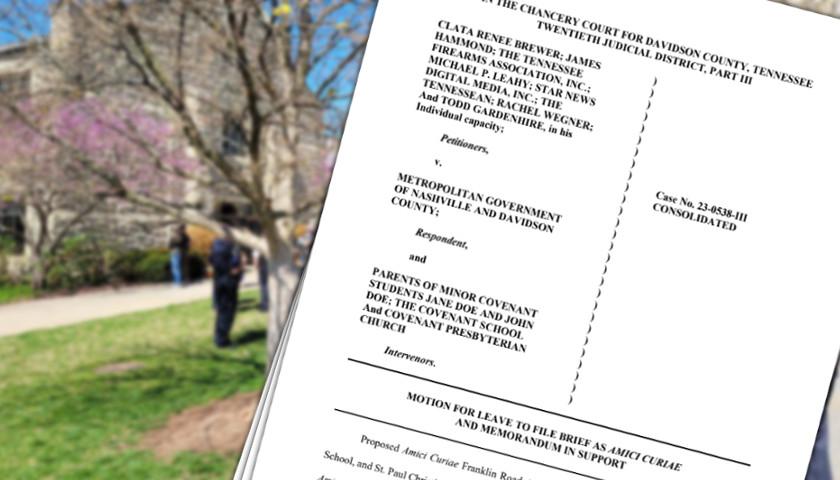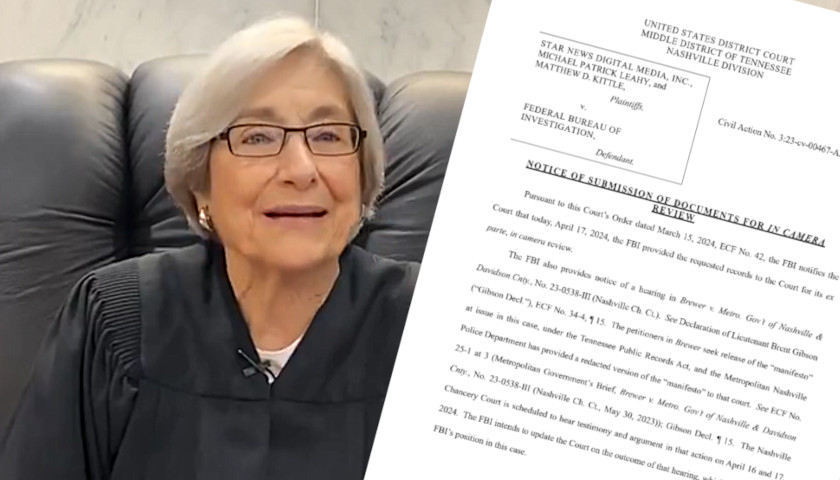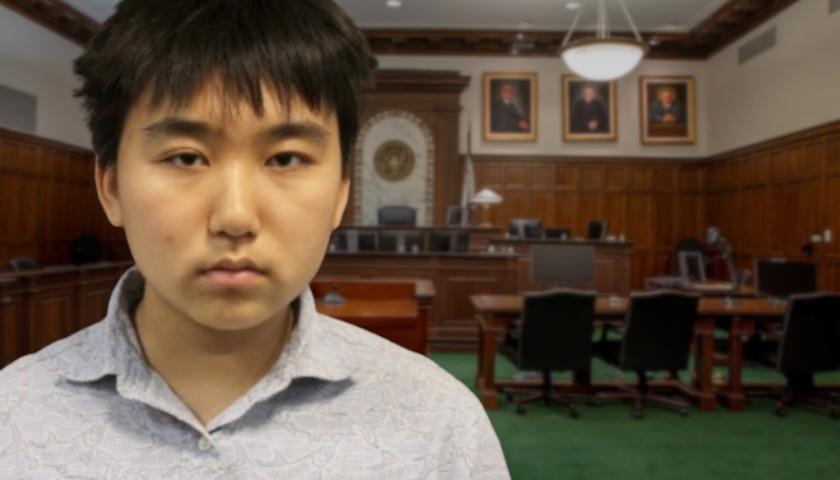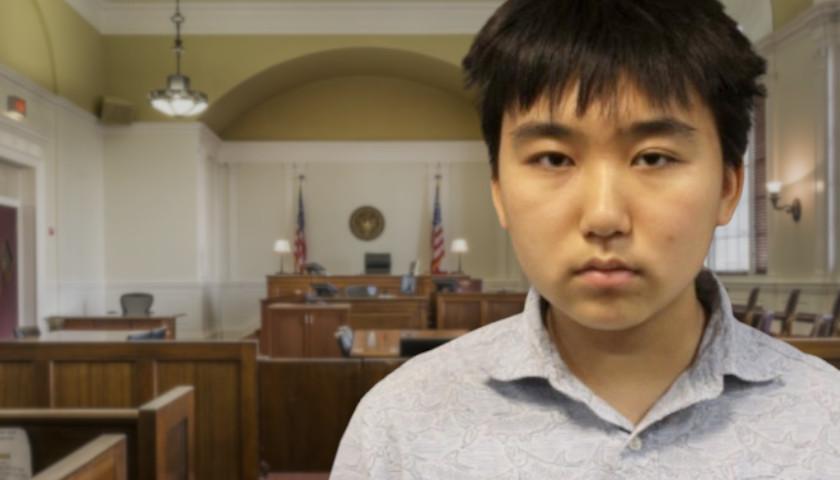Four Nashville private schools are seeking entry into a nationally watched public records lawsuit that demands the release of the Covenant School killer’s manifesto and related documents.
Attorneys for Franklin Road Academy, Montgomery Bell Academy, Oak Hill School, and St. Paul Christian Academy filed a motion on Monday asking Davidson County Chancellor I’Ashea Myles for permission to file an amicus — friend of the court — brief in the lawsuit.
The attorneys argue the schools are “woven into Nashville’s educational fabric and located in close proximity to Intervenor The Covenant [Presbyterian] School.” That’s where Audrey Elizabeth Hale fatally shot three 9-year-olds and three staff members on the morning of March 27. The 28-year-old woman, who identified as a transgender male, was shot dead by police 14 minutes after she began her rampage.
Covenant Presbyterian Church, its school and dozens of unidentified parents of Covenant School students have been allowed to intervene in the lawsuit.
“Though no one has been impacted as profoundly as Intervenors, the safety and security of each Amici likely will be directly and distinctly impacted by the disclosure of documents sought by Petitioners under the Tennessee Public Records Act (“TPRA”)—the investigative file of the Metro Nashville Police Department (“MNPD”) related to the events on March 27, 2023 and, primarily, the assailant’s writings,” the schools’ court filing states.
They want to “express their perspective” on the “school security” exception in the records act as “educational institutions that will also be impacted by a disclosure of the assailant’s writings and who look to the Courts to apply the exception in other matters.”
Premature disclosure of the police department investigate file could impact school safety and security, the schools argue.
But the plaintiffs in the lawsuit — including Star News Digital Media, parent company of The Tennessee Star — are not requesting maps, schematics or related information of Covenant school and the adjoining property, as some contend. They are requesting the writings of a killer that could shine light on her deadly motivations and mindset, records they believe must be made public.
The private schools make similar arguments as Covenant School and the other intervenors, that media coverage on prior mass shootings “inspires subsequent, copycat assailants.”
“Further, during the MNPD’s ‘active, ongoing criminal investigation,’ continues to comb through bank, social media, phone, and internet records ‘to determine if related crimes were committed, are being planned, or whether other people were involved,’” the schools state in the court filing.
Metro Nashville has cited Rule 16 of Tennessee’s Rules of Criminal Procedure and Tennessean v. Metro. Gov’t of Nashville, 485 S.W.3d 857 (Tenn. 2016) in support of the denials. The claim is that “state, federal, or other applicable law prohibits” disclosure of the records of an ongoing or underlying criminal proceeding. There appears to be no such proceeding.
Law enforcement officials have said Hale acted alone. They later argued in declarations that the investigation into the incident continued and could take as long as a year to complete.
Davidson County District Attorney General Glenn Funk has also asked the court to allow his amicus brief arguing that the parents of Covenant students are victims and entitled to certain rights.
Attorneys for family members of the students and staff argue those rights allow them to keep the documents locked from the public, a controversial legal theory that plaintiffs in the lawsuit say could have a chilling effect on Tennessee’s public records laws.
Last week, the attorney for the parents of Audrey Elizabeth Hale notified the court his clients intend to assign rights to those documents over to the children of the school.
Hale’s parents, Ronald and Norma Hale, are claiming intestate possession of their daughter’s documents. The laws of intestacy establish a specific order of priority for the distribution of assets. Typically, a surviving spouse and children are given priority, followed by other close relatives, such as parents and siblings. If there are no surviving relatives, the assets may be turned over to the state.
Hale’s legal counsel, David Raybin, argues they have the rights to their daughter’s manifesto and related writings about her bloody crimes. That argument would effectively bypass Tennessee Public Records laws that have long held such records are a matter of public interest.
Myles set the show cause hearing, which was originally slated for last week, for July 13-14, as Hale’s manifesto and related documents said to detail her March 27 mass shooting at Covenant Presbyterian School remain locked from the public in police custody.
Read the schools’ motion:
– – –
M.D. Kittle is the National Political Editor for The Star News Network.
Photo “Covenant Presbyterian School” by Metro Nashville Police Department.









Given Covenant’s history, they are definitely covering up something.
Release the shooter’s writings, phone records and internet activities.
When I read this story, TWO broad general questions come to mind: (a) WHAT, factually, is it that all of these people want to conceal by not allowing the memorandum to be made public; and, (b) WHO is trying to avoid civil liability (i.e., money damages), and even possibly, criminal liability (i.e., prison sanctions and/or criminal fines and/or other penalties)? There are many other questions that come into ‘play’, of course, but in my mind, these are the two big questions because they are the motivations for all else that follows. Whatever the local trial courts decide, I hope that the litigants ultimately appeal this law suit to the Tennessee Supreme Court. Tennessee, in my opinion, needs a definitive ruling on this important issue by the State’s highest appellate court—a ruling that will bind all future trial courts in similar future cases if such events ever happen to occur again in Tennessee.